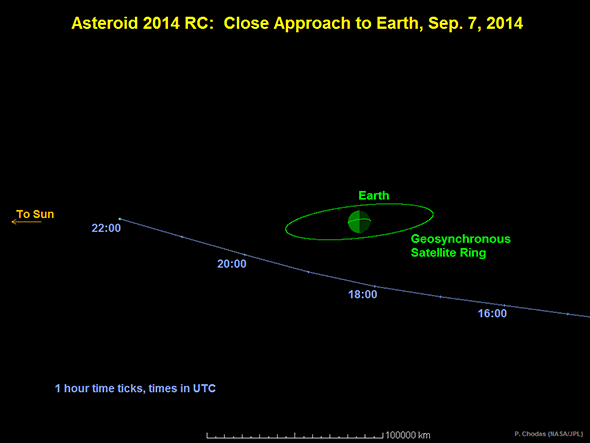Create a free profile to get unlimited access to exclusive videos, sweepstakes, and more!
Small Asteroid Will Pass Earth Closely but Safely on Sunday

On Sunday, Sept. 7, 2014, Earth will get yet another close shave from an asteroid. This time it’s a rock called 2014 RC, and it’ll blow past us at about 18:00 UTC (2 p.m. Eastern), missing the planet by something like 35,000 kilometers (22,000 miles).
2014 RC was discovered just a few days ago by the Catalina Sky Survey, on Sept. 1. Given its distance and brightness, it’s probably about 20 meters across—the same size range as the Chelyabinsk asteroid that blew up over Russia in February of 2013.
To be clear: It’ll miss us. We’re safe. But it does get pretty close, about the same distance as orbiting geosynchronous weather and communication satellites. Even though it’s bigger than those satellites, it’s very faint; the prediction is it’ll be about 11th magnitude, or about 1/100th the brightness of the faintest star you can see with your unaided eye. It’ll take a decent-sized telescope to spot it.*
This is all a reminder that these things do whiz past us fairly often, and even if they’re big enough to do damage should they hit us, we generally don’t get a lot of warning beforehand. Asteroids like this are just too faint. Happily, they don’t hit us very often.
Still, at the very least, we need bigger ‘scopes for asteroid searches. We’re doing pretty well in that department, with Pan-STARRS, and the LSST (which is still some years away from operating). But even then they can’t cover the whole sky, which is why I support the efforts of both the B612 Foundation and NASA’s NEOCam. A lot of science will come from these missions at the very least, and who knows? If they do spot a rock with our name on it, at least we’ll get the chance to do something about.
*I expect there will be hastily thrown-together YouTube videos about this asteroid that will overabundantly use the word “sheeple.” You can safely ignore them. Always.
Tip o’ the Whipple Shield to Ron Baalke and BABloggee Douglas Troy.
[UPDATE (Sep 7, 2014): I originally neglected to add the group that discovered the asteroid, so I added it in.]


























